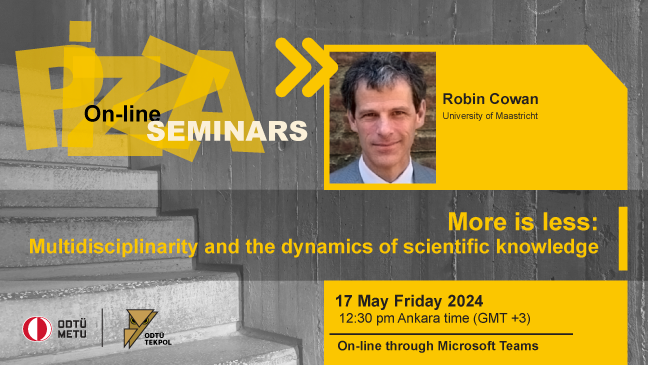TEKPOL Pizza Seminars_17052024_Robin Cowan
Last Updated:
- English
- Türkçe
Dear TEKPOL Partners,
We are be proceeding with TEKPOL Pizza Seminars in Spring Semester 2024, with valuable on-line and in-person guests throughout the year.
Our next guests this semester will be Robin Cowan from the University of Maastricht. His presentation title will be; More is less: Multidisciplinarity and the dynamics of scientific knowledge.
The seminar will be held on 17 May (Friday) 2024, at 12:30 pm Ankara time (GMT +3) through Microsoft Teams. Meeting link will be shared with the registered participants before the session.
The moderation of the seminar will be conducted by Prof. Semih Akcomak from METU TEKPOL.
Registration is mandatory and the form can be reached through this link:
https://forms.gle/LHAtckxe3eL23fYb8
It is possible to register until Thursday evening before the seminar (16 May 2024)
Hope to see you there.
TEKPOL Team
About Robin Cowan:
Robin Cowan is Professor of the Economics of Technical Change at the University of Maastricht, and Professor of Management at the Faculty of Economics and Management at the University of Strasbourg. He began his official affiliation with UNU-MERIT in 1997 as a Professorial Fellow. He is currently the Director of the PhD programme in Econonics, Innovation and Governance for Development and UNU-MERIT. He studied at Queen's University in Canada and at Stanford University where he received a PhD in economics and an MA in philosophy. Robin Cowan was Assistant Professor of Economics at the University of Western Ontario until 1998. His current research includes several topics: the changing economics of knowledge; social networks and innovation; network structure and network performance; universities and science in emerging economies; interacting agents models. In the past he has done consulting research for the OECD on the economics of standards, the European Commission on innovation policy, and the National Renewable Energy Laboratory on technological lock-in and renewable energy technologies. In 2004 he won one of 15 prestigious Chaires d'Excellence of the Ministry of research and Education in France, and in 2013 was made a Senior Member of the Institut Universitaire de France.
About the Seminar:
This seminar will be based on the presenter's paper developing a simple model of academic research to analyse knowledge flows within a research system, when demand for multi-disciplinarity varies. Scientists are embedded in departments, linked to all others in the department, as well as to a small number of others outside the department. Pairs of scientists collaborate to produce 'papers'. They can collaborate successfully with their direct links provided the distances in knowledge space between partners are within specified upper and lower bounds. By creating new knowledge, co-authors converge in their knowledge endowments, and the distance between them can fall below the lower bound. This is mitigated in two ways: extra-departmental links; and an intermittent job market in which scientists can change departments. In a simulation model we find that increasing the extent of extra-departmental links, and increasing job market activity both improve aggregate knowledge production. These two modes of knowledge diffusion are, however, substitutes rather than complements: increasing both does not improve performance over increasing only one. In addition, we find that increasing demands for multi-disciplinarity (essentially increasing the lower bound on knowledge distance for effective collaboration) generally decreases knowledge production.
















